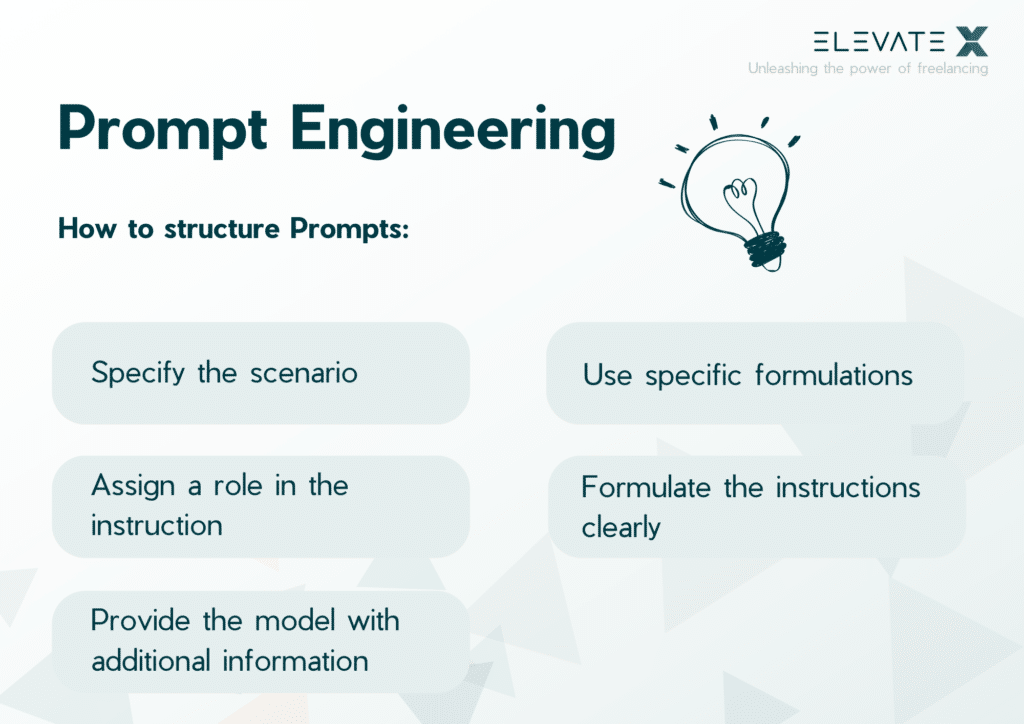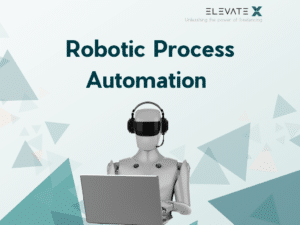A career in Prompt Engineering seems promising given the increasing growth of artificial intelligence (AI) in various industries. Tech companies from around the world are seeking qualified and efficient Prompt Engineers. Not only do they have the opportunity to further develop their skills, but they can also earn a substantial salary from it.
What Is Prompt Engineering?
Prompt Engineering is an exciting approach in the world of artificial intelligence, specifically in natural language processing. What makes it special? In Prompt Engineering, the description of the task we want the AI to fulfill is directly embedded in the input itself. Instead of explicitly specifying it, we can formulate it as a question, for example.
Imagine you want to find out tomorrow’s weather. Instead of simply asking, “What will the weather be like tomorrow?” you can use the prompt and say, “Tell me if I need an umbrella tomorrow.” This way, the AI not only understands the question but also the context and can provide you with a suitable answer.
But that’s not all! As part of Prompt Engineering, a prompt-based dataset is usually created, containing one or more tasks. We then train a language model using a technique called “prompt-based learning” or simply “prompt learning.” This enables the AI to understand and process tasks in a way that directly addresses you and provides a seamless interactive experience.
Fascinating, isn’t it? Prompt Engineering opens up new possibilities for improving our interactions with AI systems and teaching them exactly what we expect from them. Whether you’re searching for information, need a recommendation, or want to solve complex tasks, Prompt Engineering allows the AI to intuitively understand your needs.
KEY POINTS
- As AI is slowly being integrated into most industries, the demand for Prompt Engineers is also increasing.
- In Prompt Engineering, the description of the task we want the AI to fulfill is directly embedded in the input itself.
- Researchers in various fields use Prompt Engineering to improve the performance of LLMs in a wide range of tasks.
- To become a Prompt Engineer, one must possess specific skills to easily develop and refine prompts for AI models.
What Does A Prompt Engineer Do?
Researchers in various fields use Prompt Engineering to enhance the performance of LLMs (Large Language Models) in a variety of tasks. From solving common challenges like question answering to tackling complex problems like arithmetic reasoning, Prompt Engineering is a driver of innovation. Additionally, developers use Prompt Engineering techniques to design robust and effective strategies for the prompting interface with LLMs and other tools.
However, Prompt Engineering encompasses much more than just designing and developing prompts. It embodies a wide range of skills and techniques that enable you to interact with and further develop LLMs. By mastering Prompt Engineering, you not only gain the ability to effectively interact with language models but also enhance their existing capabilities.
What Skills Are Needed As A Prompt Engineer?
To become a Prompt Engineer, you need to possess specific skills that allow you to easily develop and refine prompts for AI models.
The foundational technical skills a Prompt Engineer must have include efficient analytical and problem-solving abilities. Additionally, depending on the application, technical experience in big data technologies like Hadoop or Apache Spark can be helpful.
Apart from that, it is beneficial to have good knowledge of programming languages such as Java, C++, and Python. This will enable you to understand the functioning of AI models and modify text to achieve the desired outcome. You also need to be familiar with AI tools and data analysis techniques to maximize the efficiency and accuracy of the prompts you create.
Having a comprehensive understanding of NLP (Natural Language Processing), AI-generated content development, and machine learning is essential. Learning NLP will help you generate correct prompts.
Prompt Engineering involves working with large datasets and creating prompts, so it can be highly advantageous to know how to manage and store data or perform data analysis. While a deep understanding of algorithms and data structures is not required, knowledge in these areas will facilitate your work.
Looking for a Prompt Engineer?
How Much Does A Prompt Engineer Earn?
According to reports from various media outlets, including Bloomberg, the Google startup Anthropic recently posted a job advertisement for a Prompt Engineer. The salary for this position can reach up to $335,000 per year. A similar position is also available at the California-based company Klarity, with an annual salary of $230,000. These positions are thus endowed with an annual salary of up to $335,000 (approximately €309,000) and do not necessarily require a technical degree.
In Which Industries Are Prompt Engineers In Demand?
As AI is slowly being integrated into most industries, the demand for Prompt Engineers is also rising. The benefits of AI are so tremendous that it entices companies from all sectors to integrate the technology into their businesses. Over time, as AI continues to grow, more industries will join the trend of adopting AI, ultimately leading to more hiring of Prompt Engineers.
Many news websites are currently hiring Prompt Engineers as they implement AI models like ChatGPT in their organizations. They require assistance in creating and modifying prompts that optimize the agency’s news content. AI contract review firms are also seeking support in training large language models and optimizing prompts to deliver the desired outcomes.
AI-based companies also hire Prompt Engineers to effectively communicate with AI models and train them according to the organization’s requirements. Prompt Engineers also have good prospects in the e-commerce industry.
How To Structure Prompts?
Here are some ideas on how to structure the context to generate useful results from ChatGPT or other LLMs:
- Instead of leaving the model to its own devices, specify the scenario and scope in the instruction by providing details about “what, where, when, why, who, and how.”
- Assigning a role in the instruction, such as “As a computer science professor, explain what machine learning is,” instead of simply saying “Explain what machine learning is,” can make the response more academic.
- You can control the output style by using specific formulations, such as “Explain it to a 5-year-old child,” “Explain it using an analogy,” “Make a persuasive statement,” or “in 3 to 5 points.”
- To encourage the model to respond with a chain of thought, end your request with “Solve this in steps.”
- You can provide the model with additional information by stating, “Referring to the following information,” followed by the material the model should work with.
- Since the previous conversation history forms the context, it may be useful to start the instruction with “Ignore all previous instructions before this one” to make the model start from scratch.
- It’s important to clearly and comprehensibly formulate the instruction as the deduced context can more accurately reflect your intention.

Conclusion
A career in Prompt Engineering is highly promising given the growing use of Artificial Intelligence (AI) across various industries. Prompt Engineers not only have the opportunity to advance but also earn an attractive salary. However, technical skills such as problem-solving ability and knowledge of programming and data analysis are required. The demand for Prompt Engineers is increasing in various industries, including news agencies, AI contract review, and e-commerce. By skillfully crafting prompts, one can optimize the results of AI models and control their output style. Clearly formulated instructions are crucial for accurately communicating the desired intent. Prompt Engineering thus offers exciting prospects in the world of artificial intelligence.
Prompt Engineering is an exciting approach in the world of artificial intelligence, specifically in natural language processing.
What makes it special? In Prompt Engineering, the description of the task we want the AI to fulfill is directly embedded in the input itself. Instead of explicitly stating it, we can formulate it as a question, for example.
According to reports from several media outlets, including Bloomberg, the Google startup Anthropic recently posted a job advertisement for a Prompt Engineer. The salary for this position can reach up to $335,000 per year.
The fundamental technical skills that a Prompt Engineer must have are efficient analysis and problem-solving abilities. You also need technical experience in big data technologies such as Hadoop, Apache Spark, and various other technologies.








